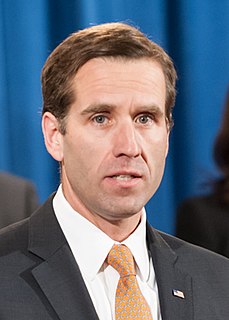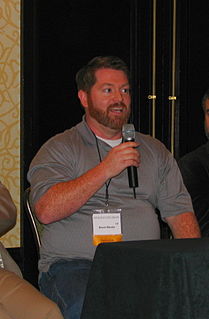A Quote by Douglas Rushkoff
Narrative Collapse is what happens when we no longer have time in which to tell a story. Remote controls and DVRs give us the ability to break down narratives - particularly the more abusive ones. This is a great thing for escaping the 'ends-justify-the-means' traps of 20th-century wars and religions, but it can also make it hard to convey values.
Related Quotes
We've wanted to produce more in the 19th century and the 20th century in order to give man the possibility for more dignified human life; but actually what has happened is that production and consumption have become means - have ceased to be means and have become ends, and we are production crazy and consumption crazy.
Julio's Day is a story of one man's life, but it's a great more than that as well. It's the story of the life of a century, also told as if a day. Beginning with Julio's birth in 1900 and ending with his death in 2000, the graphic novel touches on most of the major events that shaped the 20th century.
It is however, difficult to make your narratives relative by yourself. A novelists' work is to provide models to make your narratives relative. If you read my novels then you may feel, "I have the same experience as this narrative", or "I have the same idea as this novel". It means that your narrative and mine sympathize, concord and resonate together.
Now it is usual-but not to say normal-for people to interest themselves primarily in means, without noticing that means exist only in relation to ends and that, in accepting certain means, they unconsciously accept the ends that make them so. In other words, they accept whatever philosophy happens to be embodied in the values and institutions of a particular civilation.
Economic control is not merely control of a sector of human life which can be separated from the rest; it is the control of the means for all our ends. And whoever has sole control of the means must also determine which ends are to be served, which values are to be rates higher and which lower, in short, what men should believe and strive for.
In the 17 years since I graduated from this great College of Law, I have seen that, for many of us, it becomes increasingly easy to rationalize our actions in the name of expediency when facing difficult decisions-to choose a path where the ends justify the means. I want to ask you to challenge Machiavelli's philosophy. I want to humbly suggest that you be the guardians of a more complicated truth: that the means are as important-and sometimes even more important-than the ends.
Life is nothing in itself. It’s a place marker that proves who’s winning, and we are the winners. We are always the winners. There is nothing but the winning. Even winning means nothing. We win because it’s an insult to lose. The ends don’t justify the means. The means don’t justify the ends. There is no one to justify to. There is no justice.” ~ Durzo Blint
To read fiction means to play a game by which we give sense to the immensity of things that happened, are happening, or will happen in the actual world. By reading narrative, we escape the anxiety that attacks us when we try to say something true about the world. This is the consoling function of narrative — the reason people tell stories, and have told stories from the beginning of time.






































